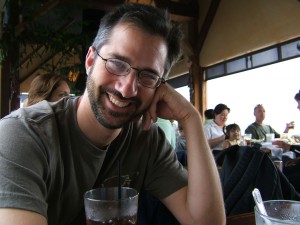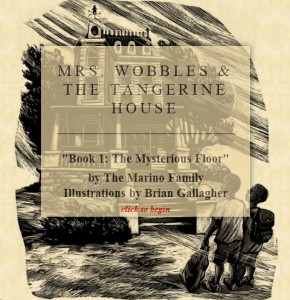In this next installment of our Alumni Interview series, I talked to Mark Marino (1996) about his post-MFA trajectory, his current projects, “netprov,” and the rewards and drawbacks of twitter.
 1) First and foremost, how did you go about deciding you wanted to become a writer?
1) First and foremost, how did you go about deciding you wanted to become a writer?
One day when I was off school in second grade, my grandmother, who was watching me, had to go take care of some things in the kitchen, so she sat me down at the dining room table with a pencil and some sheets of paper and said, “Hey, why don’t you write a story?” And that was that. Of course, it didn’t hurt that I had learned storytelling at the feet of both of my grandmothers.
2) Did you have any mentors along the way who really affected your approach to craft?
When I got to Notre Dame I encountered some wonderfully dedicated faculty mentors. Certainly Sonia Gernes, Valerie Sayers, and William O’Rourke. Sonia was so attentive to characters, probing our understandings of their backstories and the logic of the tale. She’s also the one who convinced me that regular (daily) writing was key. Valerie, on the other hand, inspired me so with her sense of humor and the vitality of her own fiction. William had a way of pushing us all to want to hit some writing that had some power in it.
Otherwise, many in the electronic literature community have helped me along, including George Landow (whom I studied under at Brown) and Steve Tomasula, whom I first met through the &Now Festival held at Notre Dame a decade after I’d graduated. These two men had a sense of the possibility of innovation and experimentation that I had found so appealing in my favorite authors.
3) What’s your fondest memory of your MFA years at Notre Dame?
At Notre Dame, I founded a sketch comedy troupe called the Humor Artists, which is still performing shows on campus. Our rehearsals and shows were wildly creative. I never knew what to expect, but it was wonderful to collaborate with undergrads from ND and St. Mary’s on sketches and improv comedy. From the “Bob Has a Tapeworm” saga to our improvised shipboard murder mystery improv, our productions walked a very strange edge of comedy. Alan Laser, one of my chief collaborators in that group, later went on to start an online humor magazine with me, called Bunk Magazine.
But my favorite memories revolve around one key person, since I met my lovely wife while there.
4) What are you doing for a living now?
I teach expository writing at USC, emphasizing the ways writing with computers has changed the way we research and communicate. That work picks up directly on the training I got at ND, where I was allowed to develop my own courses.
5) What kind of writing do you do?
My work is mainly in experimental electronic literature, though I continue to do occasional writing for the stage, such as a musical I am currently writing.
6) Hold up, you’re writing a musical? Would you mind telling us what it’s about?
The musical is about Mexican-American gangs in Los Angeles around the time of the LA Riots. It’s not exactly West Side Story. But not exactly “The Wire.” Somewhere in between. A few years ago, I adapted my hypertext novella, a show of hands, for the stage. That story explored the lives of 3 Mexican-American sisters. The experience of adapting the material into a play, and working with some very talented Latino actors, made me want to delve further into exploring cultures and subcultures in LA on stage.
7) What kind of writing projects are you working on now? How are they going?
A big focus of my work has been interactive storytelling. For the past year, I’ve been working on Mrs. Wobbles and the Tangerine House (http://markcmarino.com/mrsw/), a series of interactive children’s stories in collaboration with my two kids. It’s been so exciting sharing storytelling with them. We love to dream up wild adventures. For Mrs. Wobbles, I’m using the same system, called Undum, that I used for “Living Will” (http://markcmarino.com/tales/livingwill.html) about a coltan magnate who exploited the Congo for his riches, a tale told through his electronic will. 
Also, collaborating with Rob Wittig, I have been engaging in online writing games, called netprovs, for example, OccupyMLA (http://markcmarino.com/wordpress/?page_id=117), the tale of a fictional occupy movement advocating for adjunct rights told via Twitter. Recently, we also created “Speidishow” (http://speidishow.com), a fictional reality show for Spencer Pratt and Heidi Montag. That followed a project earlier that year where Rob and I ran Spencer’s Twitter account as an obscure British poet who had found Spencer’s mobile phone.
8) Netprov, what’s that?
Netprov is improvised networked narrative, a form of writing which combines my love of improv with experimentation in electronic media. It takes up the emergent performance of improvisation that I studied with Second City during a summer during my MFA and uses social media as its stage. It also inherits the generative play of literary games and genres in the footsteps of groups like the Ourvoir de Literature Potentialle (Oulipo). It’s been the main area that Rob and I have been developing. You can see more here: http://www.dichtung-digital.de/en/journal/aktuelle-nummer/?postID=577
9) It seems that every form has its limits and rewards. What have you found to be the limits of twitter as a form? And its rewards?
Twitter’s good for serialized fiction. But people mostly read it for one-liners. You can’t count on readers going back and catching up on what they missed to seek out the context, as they might with episodic television or most types of print narrative. So each Tweet has got to contain the entire story. Also, people get very upset when you flood their Twitter feeds. That’s what I found out when I was Tweeting through @spencerpratt’s account in Tempspence and SpeidiShow. That meant I had to spread out thoughts over five to ten-minute intervals. Imagine if you had to deliver a novel that way!
The rewards of Twitter are the instant interaction with followers, the back and forth. Occupy MLA exploded once people, including the person who ran that convention, started to Tweet back at the account. Tempspence (my fictional poet who was running Spencer Pratt’s account) was joined nightly by Twitter fans who wanted to play poetry games that he’d create. In fact, those fans were the ones who dubbed him Tempspence. It’s the unpredictable and exhilarating experience interacting with those out there in the Twitterverse that makes this such an exciting venue.
10) Do you have any secret for getting writing done out “in the real world”?
You know, a revolution transformed publishing since I was in my MFA. Authors now have complete ability to publish work. However, circulating that work is another question. I rely heavily on social media, but I also have my favorite journals and conferences where I know my work fits well. Playing an active role in literary communities, live or online, helps you to get to know where the audiences gather as well as the people in charge of the venues where your work is most suited.
Yes, dig deep, experiment. Don’t be only focused on completing your thesis. Also, this is the time to develop those habits of writing that will sustain you throughout your life.
Cheers,
Dev